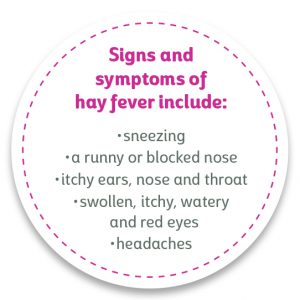Hay fever is the common name for allergic rhinitis. It is an allergic reaction in the nose, throat and eyes.
Most people associate hay fever with spring, when airborne pollens from grasses are highest. However, hay fever can occur at any time of the year.
[bs_row class=”row”][bs_col class=”col-sm-6″]
Common allergic triggers include:
- pollens from trees, plants and grasses
- dust mites
- mould
- animal hair or fur.
Suggestions to prevent or limit the symptoms of hay fever include:
- stay indoors as much as possible on windy days in spring
- keep windows and doors shut when pollen count is high
- identifying the cause of the allergy and avoiding further contact with it
- start treatment early and take it regularly, especially if you know you will be exposed to triggers.
[/bs_col][bs_col class=”col-sm-6″]
[bs_row class=”row”][bs_col class=”col-sm-6″]

[/bs_col][bs_col class=”col-sm-6″]
[/bs_row]
Common, over-the-counter hay fever medicines include:
- antihistamine tablets – which may ease mild symptoms
- steroid nasal sprays – one of the most effective treatments when used regularly
- nasal irrigation – can relieve sinus symptoms
- eye drops – may help relieve swollen, itchy, red or watery eyes.
